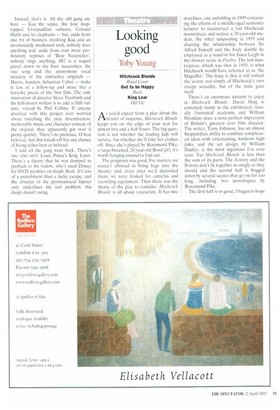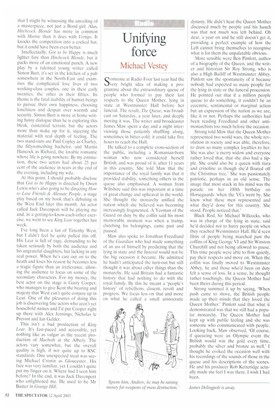Looking good
Toby Young
Hitchcock Blonde Royal Court Got to be Happy Bush King Lear Old Vie
Aslinyou'd expect from a play about the aster of suspense, Hitchcock Blonde keeps you on the edge of your seat for almost two and a half hours. The big question is not whether the leading lady will survive, hut whether she'll take her clothes off. Since she's played by Rosamund Pike, a large-breasted, 24-year-old Bond girl, it's worth hanging around to find out.
The prognosis was good. For starters, we weren't allowed to bring bags into the theatre and, even after we'd deposited them, we were frisked for cameras and recording equipment. Then there was the theme of the play to consider. Hitchcock Blonde is all about voyeurism. It has two storylines, one unfolding in 1999 concerning the efforts of a middle-aged semiotics lecturer to reconstruct a lost Hitchcock masterpiece and seduce a 20-year-old student, the other unspooling in 1959 and charting the relationship between Sir Alfred himself and the body double he employed as a stand-in for Janet Leigh in the shower scene in Psycho. The lost masterpiece, which was shot in 1919, is what Hitchcock would have referred to as 'the Maguffin'. The hope is that it will unlock the secret, not simply of Hitchcock's own creepy sexuality, but of the male gaze itself.
There's an enormous amount to enjoy in Hitchcock Blonde. David Haig is extremely funny as the embittered, sexually frustrated academic and William Hootkins does a note-perfect impression of Britain's greatest ever film director. The writer, Terry Johnson, has an almost Stoppardian ability to combine complicated ideas with entertaining, lowbrow high jinks, and the set design, by William Dudley, is the most ingenious I've ever seen. Yet Hitchcock Blonde is less than the sum of its parts. The A-story and the B-story don't fit together as snugly as they should and the second half is bogged down by several scenes that go on for too long, including two monologues by Rosamund Pike.
The first half is so good, I began to hope that I might be witnessing the unveiling of a masterpiece, not just a Bond girl. Alas, Hitchcock Blonde has more in common with Mamie than it does with Vertigo. It knocks the competition into a cocked hat, but it could have been even better.
Intellectually, Got to be Happy is much lighter fare than Hitchcock Blonde, but it packs more of an emotional punch. A new play by a talented young writer called Simon Burt, it's set in the kitchen of a pub somewhere in the North-East and examines the complicated love lives of two working-class couples, one in their early twenties, the other in their fifties. Its theme is the fatal inability of human beings to pursue their own happiness, choosing loneliness and despair over warmth and security. Simon Burt is more at home writing funny dialogue than he is exploring this bleak, existential terrain, but the actors more than make up for it, injecting the material with real depth of feeling. The two stand-outs are Paul Copley as Charley, the fiftysomething bachelor, and Martin Hancock as Richard, the lovable romantic whose life is going nowhere. By my estimation, these two actors had about 25 per cent of the audience in tears at the end of the evening, including my wife.
At this point, I should probably disclose that Got to be Happy is directed by Owen Lewis who's also going to be directing How to Lose Friends & Alienate People, a stage play based on my book that's debuting in the West End later this month. An actor called Jack Davenport will he playing me and, in a getting-to-know-each-other exercise, we went to see King Lear together last week.
I've long been a fan of Timothy West, but I didn't feel he quite pulled this off. His Lear is full of rage, demanding to be taken seriously by both the audience and his ungrateful daughters, but lacking in any real power. When he's cast out on to the heath and loses his reason he becomes less a tragic figure than an irrelevance, allowing the audience to focus on some of the secondary characters. For my money, the best actor on the stage is Garry Cooper, who manages to give Kent the bearing and majesty that West can't quite conjure up in Lear. One of the pleasures of doing this job is discovering fine actors who aren't yet household names and I'd put Cooper right up there with Alex Jennings, Nicholas le Prevost and Ian Gelder.
This isn't a had production of King Lear. Its fast-paced and accessible, yet nothing like as vulgar as the recent production of Macbeth at the Albery. The actors vary somewhat, but the overall quality is high, if not quite up to RSC standards. One unexpected treat was seeing Michael Cronin as Gloucester. His face was very familiar, yet 1 couldn't quite put my finger on it. Where had I seen him before? In the end, it was Jack Davenport who enlightened me. He used to be Mr Baxter in Grange Hill.



































































 Previous page
Previous page